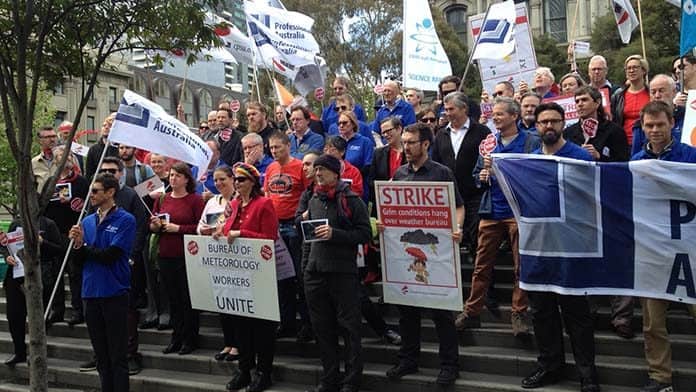In early July the Bureau of Meteorology secured staff support for a substandard Enterprise Agreement offer. The vote was very close, with only 51 per cent voting Yes, the difference being 36 staff.
The previous agreement expired four years ago, and in that time three other offers have been voted down. The federal public service bargaining policy imposed when the Coalition came to power insisted on stripping rights out of our agreements and imposed a pay cap. Bureau staff have not had a pay rise since their previous agreement expired, delivering a pay cut in real terms over the past five years.
The new agreement reduces staff rights to consultation. Staff and their representatives will now have less say over major workplace changes from management.
All the union delegate rights in the old agreement have been cut, replaced by one sentence merely stating the legitimate role of unions in the workplace. These rights included access to paid time during normal working hours, and to facilities and resources for union activities. These omissions now mean that management have more discretion over what delegates can do.
Field workers, some of the lowest paid workers in the Bureau, have been particularly hit hard. In the old agreement their allowances for accommodation, meals and incidentals would be paid before travel. This upfront allowance was also an incentive for them to travel to remote places to maintain and repair observational equipment, sometimes in adverse weather conditions, and being away from their families for days. A new travel card will deliver nowhere near what they were receiving before.
The pay increase over the three year life of the new agreement is just 6.5 per cent, which does nothing to make up for the pay cuts over the past four years. Staff union the CPSU was demanding 7.5 per cent over three years, along with back pay, but this wasn’t at the forefront of their No campaign in the lead up to the vote, instead mainly focusing on delegate’s rights, consultation, and allowances to field workers.
Union campaign
The new agreement could have been much worse if it wasn’t for the prolonged campaign by the CPSU and actions by union delegates and members. After each successful No vote management would put some conditions back into the agreement. For instance, leave loading payed on annual leave for shift workers was reinstated after the successful No vote of May 2017.
However, the drawn-out campaign also shows the lack of clout of the union’s actions. The longer it went on, the more likely it was that some staff were going to give up on holding out for a better offer.
Public sector wide CPSU stop-work meetings that were held around the country earlier in the campaign could have been used as a launching pad for coordinated cross-agency industrial action.
Instead agencies were left to bargain individually. While some of the larger agencies won improved agreements, staff at the Bureau were left increasingly isolated. Rolling stopwork actions did not bring enough pressure to bear on management to win our demands, and need to be better coordinated the next time round.
Some creative forms of industrial action were taken, such as reading out authorised CPSU statements at the start of live radio crosses, and attaching authorised hashtags and statements to forecasts and tweets.
ABC radio presenters were generally sympathetic, but ABC management instructed them to cut from air any Bureau staff who read the statement.
Management rushed to set up a system to intercept forecasts and tweets before they got to the public, basically instructing forecasters, in contravention to our legal right to take this action, to let their forecasts be intercepted and audited for the sake of “quality control”. Initially management was forced to stay up all night to take control of the situation, but eventually a computer program was written to remove the hashtags and statements automatically.
These were a welcome accompaniment to our repertoire of actions, but they weren’t enough on their own. But the narrow vote of 51 per cent for the agreement is not a mandate of support for management. Many people voted for the deal while still opposing the cuts to conditions. This means there is plenty to build on as we continue to fight back against cuts to our pay and conditions.
By a CPSU member, Bureau of Meteorology






